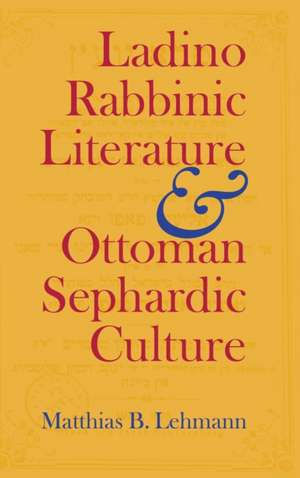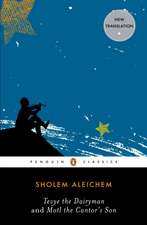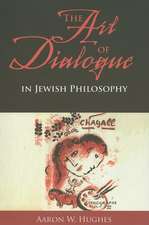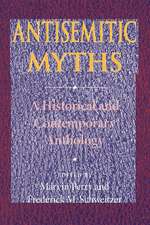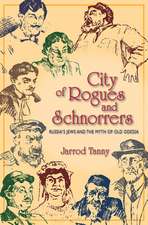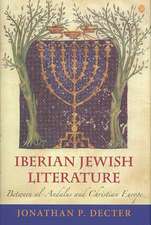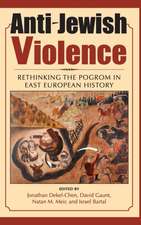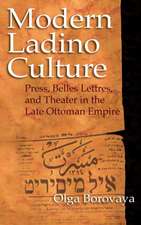Ladino Rabbinic Literature and Ottoman Sephardic Culture
Autor Matthias B. Lehmannen Limba Engleză Hardback – 2 noi 2005
Vezi toate premiile Carte premiată
National Jewish Book Award (2005)
Preț: 353.98 lei
Nou
Puncte Express: 531
Preț estimativ în valută:
67.73€ • 70.91$ • 56.05£
67.73€ • 70.91$ • 56.05£
Carte tipărită la comandă
Livrare economică 07-21 aprilie
Preluare comenzi: 021 569.72.76
Specificații
ISBN-13: 9780253346308
ISBN-10: 0253346304
Pagini: 280
Ilustrații: 5 illustrations
Dimensiuni: 164 x 241 x 24 mm
Greutate: 0.57 kg
Editura: MH – Indiana University Press
ISBN-10: 0253346304
Pagini: 280
Ilustrații: 5 illustrations
Dimensiuni: 164 x 241 x 24 mm
Greutate: 0.57 kg
Editura: MH – Indiana University Press
Recenzii
.".. an incisive examination of rabbinic authors and their readers thathighlights the importance of vernacular musar literature as a valuable andunderutilized resource for the reconstruction of Ottoman Jewish culture.... [T]hisbook is a welcome addition to the burgeoning field of Sephardic and Mizrahi studies, and it should appeal to anyone interested in the interplay between religion andculture in the modern world." -- AJS Review
"Lehmann's book is clear and didactic, containing... some eye-openingconclusions." -- American Historical Review, April 2011
"Scholars of the late Ottoman Empire and the modern Middle East more generally will undoubtedly find within this work a number of striking parallels between the responses of other individuals and groups to the growing Western influence in the region and those of the vernacular rabbis portrayed in Lehmann's study. The unexpected consequences precipitated by these rabbis' attempts to preserve their religious universe in the face of change similarly offer fruitful points of comparison. Ladino Rabbinic Literature and Ottoman Sephardic Culture will therefore also be welcomed by scholars interested in broader debates about the role religion played in the emergence of modernity and about the various ways that religious thinkers became modern, even despite themselves." --Julia Phillips Cohen, Vanderbilt University, H-Levant, March 2010--Julia Phillips Cohen, Vanderbilt University"H-Levant" (01/01/2010)
.".. [a] detailed and profound study.... Lehman's book is an important comtribution to the study of Ottoman Jewry as well as of Middle Eastern social and cultural history in general." --Rachel Simon, Princeton University Library, INTNL JRNL MID EAST STD - IJMES, Vol. 40 2008--Rachel Simon, Princeton University Library"INTNL JRNL MID EAST STD - IJMES" (01/01/2008)
Scholars of the late Ottoman Empire and the modern Middle East more generally will undoubtedly find within this work a number of striking parallels between the responses of other individuals and groups to the growing Western influence in the region and those of the vernacular rabbis portrayed in Lehmann's study. The unexpected consequences precipitated by these rabbis' attempts to preserve their religious universe in the face of change similarly offer fruitful points of comparison. Ladino Rabbinic Literature and Ottoman Sephardic Culture will therefore also be welcomed by scholars interested in broader debates about the role religion played in the emergence of modernity and about the various ways that religious thinkers became modern, even despite themselves.--Julia Phillips Cohen, Vanderbilt University"H-Levant" (01/01/2010)
"Lehmann's book is clear and didactic, containing... some eye-openingconclusions." -- American Historical Review, April 2011
"Scholars of the late Ottoman Empire and the modern Middle East more generally will undoubtedly find within this work a number of striking parallels between the responses of other individuals and groups to the growing Western influence in the region and those of the vernacular rabbis portrayed in Lehmann's study. The unexpected consequences precipitated by these rabbis' attempts to preserve their religious universe in the face of change similarly offer fruitful points of comparison. Ladino Rabbinic Literature and Ottoman Sephardic Culture will therefore also be welcomed by scholars interested in broader debates about the role religion played in the emergence of modernity and about the various ways that religious thinkers became modern, even despite themselves." --Julia Phillips Cohen, Vanderbilt University, H-Levant, March 2010--Julia Phillips Cohen, Vanderbilt University"H-Levant" (01/01/2010)
.".. [a] detailed and profound study.... Lehman's book is an important comtribution to the study of Ottoman Jewry as well as of Middle Eastern social and cultural history in general." --Rachel Simon, Princeton University Library, INTNL JRNL MID EAST STD - IJMES, Vol. 40 2008--Rachel Simon, Princeton University Library"INTNL JRNL MID EAST STD - IJMES" (01/01/2008)
Scholars of the late Ottoman Empire and the modern Middle East more generally will undoubtedly find within this work a number of striking parallels between the responses of other individuals and groups to the growing Western influence in the region and those of the vernacular rabbis portrayed in Lehmann's study. The unexpected consequences precipitated by these rabbis' attempts to preserve their religious universe in the face of change similarly offer fruitful points of comparison. Ladino Rabbinic Literature and Ottoman Sephardic Culture will therefore also be welcomed by scholars interested in broader debates about the role religion played in the emergence of modernity and about the various ways that religious thinkers became modern, even despite themselves.--Julia Phillips Cohen, Vanderbilt University"H-Levant" (01/01/2010)
Descriere
In this pathbreaking book, Matthias B. Lehmann explores Ottoman Sephardic culture in an era of change through a close study of popularized rabbinic texts written in Ladino, the vernacular language of the Ottoman Jews. This vernacular literature, standing at the crossroads of rabbinic elite and popular cultures and of Hebrew and Ladino discourses, sheds valuable light on the modernization of Sephardic Jewry in the Eastern Mediterranean in the 19th century. By helping to form a Ladino reading public and imparting shape to its values, the authors of this literature negotiated between perpetuating rabbinic tradition and addressing the challenges of modernity. The book offers close readings of works that examine issues such as social inequality, exile and diaspora, gender, secularization, and the clash between scientific and rabbinic knowledge. Ladino Rabbinic Literature and Ottoman Sephardic Culture will be welcomed by scholars of Sephardic as well as European Jewish history, culture, and religion.
Cuprins
Acknowledgments
Introduction
1 Historical Background
Part I Vernacular Musar Literature as a Cultural Factor
2 Print and the Vernacular: The Emergence of Ladino Reading Culture
Part II Authors, Translators, Readers
3 The Translation and Reception of Musar
4 "Pasar la Hora" or "Meldar"? Forms of Sociability
Part III Musar Literature and the Social Order
5 The Construction of the Social Order
6 Three Social Types: The Wealthy, the Poor, the Learned
7 The Representation of Gender
Part IV Exile and History
8 Understanding Exile, Setting Boundaries
9 The Impossible Homecoming
10 Reincarnation and the Discovery of History
Part V The Challenge of Modernity
11 Scientific and Rabbinic Knowledge and the Notion of Change
12 Conclusions
Notes
Bibliography
Index
Introduction
1 Historical Background
Part I Vernacular Musar Literature as a Cultural Factor
2 Print and the Vernacular: The Emergence of Ladino Reading Culture
Part II Authors, Translators, Readers
3 The Translation and Reception of Musar
4 "Pasar la Hora" or "Meldar"? Forms of Sociability
Part III Musar Literature and the Social Order
5 The Construction of the Social Order
6 Three Social Types: The Wealthy, the Poor, the Learned
7 The Representation of Gender
Part IV Exile and History
8 Understanding Exile, Setting Boundaries
9 The Impossible Homecoming
10 Reincarnation and the Discovery of History
Part V The Challenge of Modernity
11 Scientific and Rabbinic Knowledge and the Notion of Change
12 Conclusions
Notes
Bibliography
Index
Premii
- National Jewish Book Award Finalist, 2005
